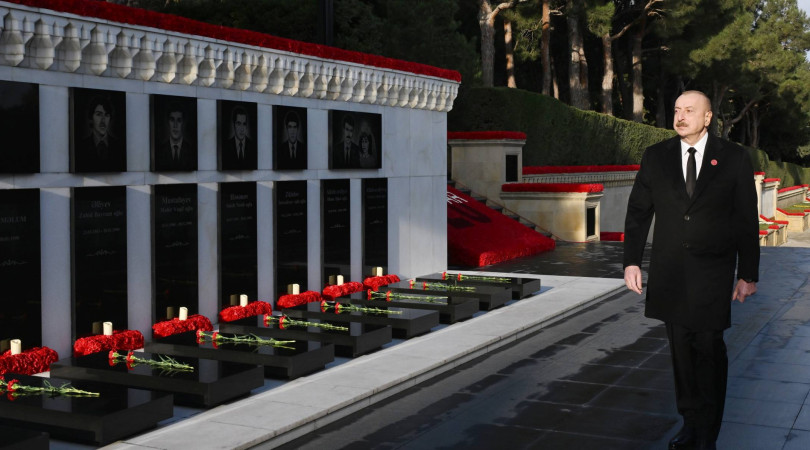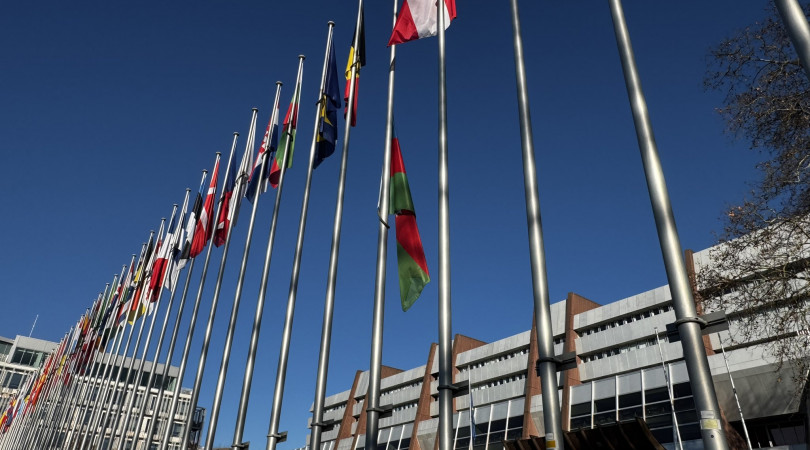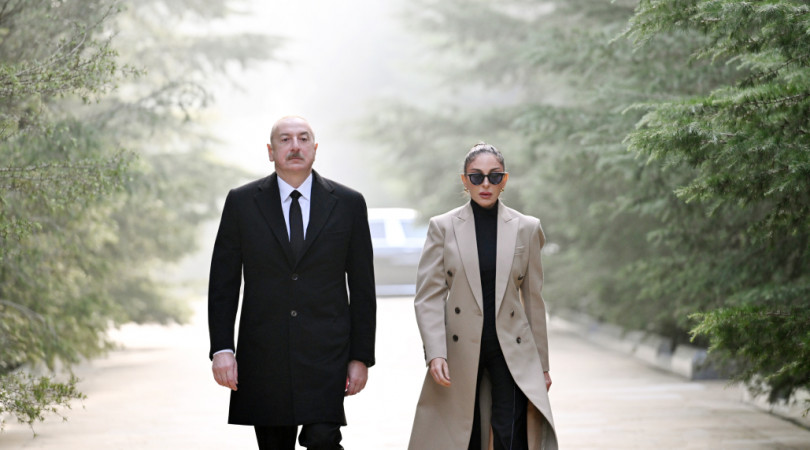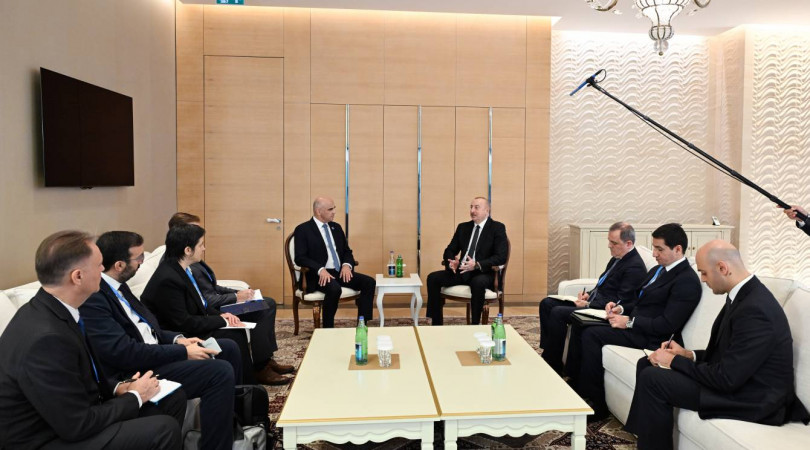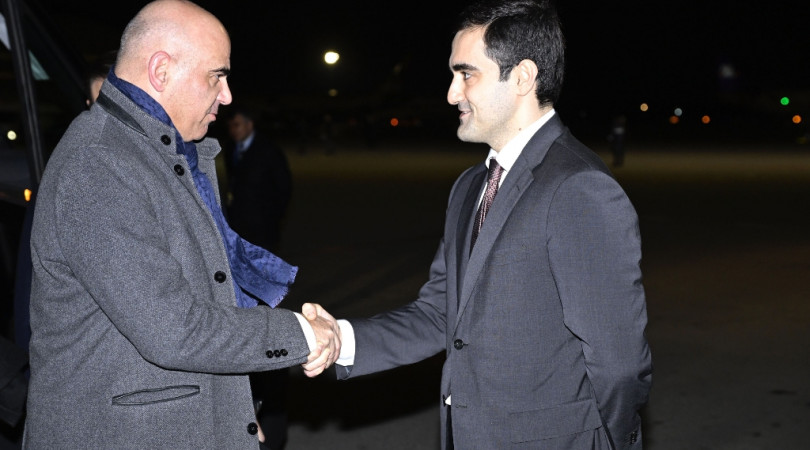Great Leader Heydar Aliyev’s strategy of national state building and modern development
Azerbaijan stepped into an important and fateful stage of its history at the end of the 20th century with the collapse of the Soviet Union in the period when the contemporary world order and new relations in the international arena started to take shape. Having to fight alone in the whirlpool of serious changes and perturbations, our people left behind difficult ordeals and succeeded in taking confident steps towards a bright future. Looking at what happened then from the prism of the realities that emerged 30 years later, we can make a long list of geopolitical, social, economic and military factors which helped get Azerbaijan out of the severe crisis as a stable and reliable state. However, it is beyond any doubt that the key factor, which stipulated Azerbaijan’s progression to the present stage of development, was the existence of a political leader, who is capable of accurately assessing the nature of complicated processes going on in the country and in the world at a decisive historic moment and clearly directing those processes to the way required by national interests. Comparison between the extremely difficult and, in some cases, even hopeless realities of the 1990s and the present stand of the state of Azerbaijan in the world helps better see the scale of services of National Leader Heydar Aliyev to the state of Azerbaijan and his genius character, who has left deep traces in the minds of our people.
The political, socio-economic and, in some instances, military experiments carried out by the great powers in different parts of the world at the end of the past century changed the fate and history of many peoples. This process is ongoing now. Probably, it will be impossible to change the nature and substance of this process as soon as the economic and political interests of the great powers persist. Therefore, it is Great Leader Heydar Aliyev’s exceptional service in the history of national statehood of Azerbaijan to ensure that his country becomes a safe and, at the same time, effective link in the chain of international relations via prediction of possible consequences of the fight for global leadership.
One of the main features of the political portrait of the national leader is his possession of deep intellect helping to accurately assess the time and processes. He managed to bring everything to the starting point by virtually stopping the time when the processes ongoing in the world and the region were moving towards a dangerous course, make the rightest decisions for Azerbaijan at the most difficult moment and pull a country, which still remained unformed in the ruins of geopolitical configuration following the collapse of the Soviet Union, out of the tragic situation it was in. Heydar Aliyev’s political wisdom helped him to see that the institutional foundations of the system of international relations had been shaken, to accurately identify that various organizations, which assumed the mission of protection of the world order as international referees, had lost their functionality and to build equal relations of partnership with the centers of power, which dictated the agenda of the world.
It was not only Azerbaijan’s peculiar historic traditions and past, but also the complicated character of the challenges and problems it faced that distinguished it from the countries, which were formed following the breakdown of the Union of Soviet Socialist Republics (USSR). The independent Azerbaijan, which the national leader started to build from its foundation after saving it from a server crisis probably in the most decisive stage of its history, confidently emerged on the political stage of the world in a period when conflicts and wars were a customary way of life in the post-Soviet area, uncertainty was accepted as a reality in public consciousness, all the ties with the past had been destroyed and no bridges to the future had ever been built.
The strategy of national state building and modern development by Heydar Aliyev, who returned to political power at the calls and insistent demands of the people in 1993, united a number of important components:
-Ensuring independence and carrying out an independent policy;
-Socio-political stability;
-Economic growth and a strong economy;
-Reforms and modern society building;
-Modern and strong army building;
-Sovereignty and restoration of territorial integrity;
-Integration into the system of international relations;
-National unity and solidarity based on the ideology of Azerbaijanism;
-Adherence to national traditions and historic roots.
The strategy of development offered to resolve these complicated and fateful issues, first of all, envisaged carrying out an independent policy, which didn’t depend on the will of other powers and was guided only by national interests, preventing trends of separatism and decentralization and establishing stability and security in the country, forming modern state administration and advanced public relations via the implementation of institutional reforms, building equal and reliable relations with the world, implementing significant energy projects and acquiring the resources required for economic growth, ensuring strong unity between the different strata of the society on the basis of the ideology of Azerbaijanism, and eventually restoring the territorial integrity of the country. The great leader’s adherence to the national idea and national and moral values and the unshaken public confidence that his initiatives, ideas and proposals, as well as his flexible and farsighted steps in foreign policy, which not everyone could immediately understand, serve the national interests of the country, were important factors to make up the political and philosophical essence of Azerbaijan’s salvation.
Not only the proponents, but also the opponents of Heydar Aliyev understood very well that it was only him who could save Azerbaijan, which was facing the threat of break-up and obliteration from the world map in the first years of its independence, from this catastrophe. It was Heydar Aliyev’s titanic efforts as a strong political figure, a pragmatic leader and a wise statesman, that put an end to the armed confrontation, which had come to the brink of a civil war, in a short time, transformed political struggle from streets and squares to the parliament and election platform and established socio-political stability in the country.
Thanks to the wise policy of the great leader, Azerbaijan succeeded in presenting itself to the world as one of the most reliable and powerful countries in the region. Azerbaijan managed to restore its function of being a bridge between the East and the West at a difficult and uncertain historic stage in which rapid transformation to the unipolar world created a serious crisis and, in some cases, catastrophes. Many assumed in the 1990s that all the bridges uniting two different civilizations of the world would be burned down and erased from the geography of the planet. But, these assumptions disappeared with the signing of the Contract of the Century in 1994 and the implementation of globally significant energy projects like the Baku-Tbilisi-Ceyhan oil pipeline in the later periods. This, of course, is considered to be a historic contribution of Heydar Aliyev’s political genius to the security of not only Azerbaijan and the South Caucasus, but also Europe, which is more urgent now in the 21st century than it was 30 years ago.
Following the adoption of the new Constitution of Azerbaijan in 1995, implementation of fundamental reforms started in all the walks of public life, a multiparty political system was formed in the country and pluralism of thought and freedom of expression and information were guaranteed. Important steps were taken towards building a market economy in Azerbaijan and the international guarantees and material resources for the country’s future development were ensured as a result of implementation of the oil strategy. It is enough to note only the fact that the gross domestic product (GDP) grew by 71% following the economic reforms in Azerbaijan under the leadership of the great leader. An investment of 8,2 billion manats were made in the development of production and non-production areas in Azerbaijan in 1993-2002. Curbing the fast growing inflation, expanding trade with foreign countries and bringing the trade turnover to 3,8 billion US dollars, which was 2,8 times more than in 1993, were the result of the establishment of a new system of economic relations in the country, which created opportunities for lasting growth. Thanks to the results-oriented policy of the national leader, serious successes were achieved in one of the parameters of Azerbaijan’s national development strategy – building a strong national economy. Speaking about the 10-year development path of our independent state at the first Congress of the World Azerbaijanis on 9 November 2001, the great leader said: “we have resolved many severe and difficult problems of Azerbaijan and we can see well the horizons ahead. Azerbaijan’s immense natural resources, favorable geographical and strategic position, strong economic and intellectual potential and the high cultural level of Azerbaijanis will ensure that our country has a very happy and prosperous future. You can be sure that this road and the horizons and prospects ahead are quite real. As a result of our economic policy, Azerbaijan will become one of the rich countries in several years”.
One of the extremely valuable services of Heydar Aliyev in our history is that he never confined himself to only implementing the national development strategy, because the existing political course needed to be continued and the political and ideological succession needed to be preserved in this regards in order to reach the set targets. If we have a look at international experience, we can see that in many cases successfully developing countries missed historic opportunities exactly due to the change in their political course. Azerbaijan, which was walking successively and dynamically through the line of national development, faced such complicated issues as completion of building a powerful state, resolution of the former Armenian-Azerbaijani conflict and restoration of the territorial integrity of the country.
The election of Mr. Ilham Aliyev as the President of the Republic of Azerbaijan through winning the great confidence and support of the people crossed out the scenarios of some internal and external forces, which were making plans about our country in line with their own interests in the period after 2003. It was the political and ideological succession that helped President Ilham Aliyev to enrich the strategy of national state building of the great leader with ideas that come from the new realities of the modern world, take on board the complex economic and political circumstances of the today’s world and lay ground to neutralize the negative appearances of transformation to the multipolar order, and pursue an independent, well-thought and principled policy.
As a result of President Ilham Aliyev’s successful economic strategy, Azerbaijan made big achievements in a short period of time. The wide-scale construction work on the basis of specific programs entirely renewed the faces of Baku and the regions, the difference between the regions and the center sharply decreased and the grandiose infrastructure projects covering all the areas in the country were implemented. Azerbaijan’s energy security was ensured, our head of state identified the issue of food safety as one of the priorities to solve and successive and purposeful actions started to be taken in this direction.
Azerbaijan, which started releasing its own satellites into the orbit in 2013, became one of the few members of the space club in the world. The signing of the adjusted and redrafted Production Sharing Agreement on the joint development of the Azeri and Chirag fields and the deep-water portion of the Gunashli field in the Azerbaijani sector of the Caspian on 14 September 2017, the extension of the development of these oil fields to 2050 and the implementation of the Southern Gas Corridor project and its TANAP and TAP segments, besides being new successes of Azerbaijan’s oil strategy after the Contract of the Century, also greatly increased the role of our country in the world’s energy markets and changed the energy map of Eurasia.
Today, more than 65% of the economic potential of the South Caucasus region is owned by Azerbaijan. Azerbaijan’s economy has grown more than three times as compared to 2003. In 2003-2021, industrial output increased by 2,7 times, agricultural production rose twice, the foreign trade turnover expanded by 6,4 times, exports grew by 7,6 times, non-oil exports by 5,2 times and the currency reserves increased by more than 27 times.
Having currency reserves of 1,8 billion US dollars in 2003, Azerbaijan now has 53 billion US dollars in currency reserves, which are 7,4 time more that the country’s foreign debt. The level of poverty has been brought from 49% down to 6%. A total of 280 billion US dollars have been invested in Azerbaijan’s economy, including half of them being foreign investments.
Azerbaijan’s important geographical position, development of its strategically important transport infrastructure in accordance with the international standards, including the construction and commissioning of the Baku-Tbilisi-Kars railroad, the new Baku International Sea Trade Port and modern airports and reconstruction of nationally and locally important roads created conditions for Azerbaijan to become an active participant in the North-South and East-West transport corridors and a transport and communications hub in the region. It is not accidental that today the European Union shows great interest to the transport infrastructure of Azerbaijan.
Fast and dynamically developing Azerbaijan has managed to strengthen its positions in the world by pursing an independent policy, which is based on its national interests. Our country makes its worthy contributions to inter-civilization and intercultural dialogue and resolution of global political, economic and humanitarian issues via hosting numerous international events. Azerbaijan, which was elected a member of the UN Security Council with the support of 155 member states in 2012, now presides over such a big organization as the Non-Aligned Movement, develops relations of partnership with the European Union, has efficient relations of cooperation with many reputable international organizations, is noted for being active in bilateral and multilateral formats of partnership and has built relations with the countries of the region on the basis of the principles of good neighborhood, friendship and efficient cooperation, is recognized in the world as a country with great reputation, a reliable partner and a country having its principled position and word on the resolution of important issues.
The successful implementation of Azerbaijan’s development strategy, the enrichment of the relations between the state and the citizens in a quantitatively new content, the formation of modern administration mechanisms, the new model of unity created by the pragmatic view of the social and ideological aspects of national solidarity and finally the successive and purposeful steps taken to strengthen the country’s military potential were actually directed towards one goal – putting an end to Armenia’s policy of occupation and restoring the territorial integrity of our country. As President Ilham Aliyev said during his speech at the 5th Congress of the World Azerbaijanis, “At the top of all our work, our policy and our steps was the purpose to make this sacred day closer and see this day”.
Back in November 1999, in his meeting with Azerbaijani writers and intellectuals, Great Leader Heydar Aliyev said: “Granting autonomy to Nagorno-Karabakh in 1923 was an evil for Azerbaijan. It is true that they wanted to grant it to Armenia, but Azerbaijan’s leaders tried and managed to keep it within Azerbaijan. It should have remained, but not as an autonomy. The autonomy granted in 1923 was a bomb inside Azerbaijan and had to blow up one day”. Facts clearly show that Armenian nationalists have made claims to our people throughout all the stages of history and have aspired over the past 200 years to carry out successive plans to build their own state at the expense of Azerbaijani territories and expand it at later stages. During 14 years of leading the Azerbaijani Soviet Socialist Republic, Heydar Aliyev’s reputation and political wisdom created a barrier in front of these malicious plans. The national leader said: “After I left Azerbaijan, unfortunately, they started the events of 1988. They loosened control over Nagorno-Karabakh bit-by-bit and they came and did it”. Armenia and world Armenians gained a historic chance to put their ugly intentions to life after the leadership of the USSR disgracefully exempted the great leader from his post in 1987. Moreover, the incompetence and betrayal of the government of the People’s Front Party and Musavat and the chaos and anarchy reigning in Azerbaijan in the early 1990s created more favorable conditions so that these plans can be carried out more easily. However, in that period, the authors of this plan never assumed that Heydar Aliyev would return to Azerbaijan again, save our state and people from destruction and prevent Armenia from making the consequences of the occupation official. In just 10 years, Azerbaijan would rise again, develop and say its decisive word at the end. Therefore, the historic victory gained in the 44-day Patriotic War in 2020 was, by essence, the greatest triumph of the strategy of national statehood, which National Leader Heydar Aliyev defined and President Ilham Aliyev improved to make it modern.
“Making our country strong, strengthening our positions on the international plane and conducting domestic processes in a positive course have been the main task in my activities over the past 17 years. No pressure and no threat could divert me from this way. Because I had one aim – to build a strong Azerbaijan and liberate our lands from occupation!”. The entire philosophy of the Azerbaijani President’s 17 years of struggle, determination, political will and decisiveness is reflected in these sentences, which are placed in one of his addresses to people.
The grandiose triumph that the brave Azerbaijani army gained in the Patriotic War under the leadership of the President and the Triumphant Supreme Commander-in-Chief, Ilham Aliyev, is a historic event, which has great moral importance for the people of Azerbaijan and, at the same time, creates new realities across the entire region. This is a fateful and glorious stage of our national development, which National Leader Heydar Aliyev started for the sake of a strong, independent and sovereign Azerbaijan after saving our people and state from destruction and taking them to the road of stable development and Ilham Aliyev successfully completed. Delivering his good news to the people on the liberation of the crown of Karabakh, Shusha, on 8 November 2020, President Ilham Aliyev expressed his thoughts this way: “Today, I visited the grave of Great Leader Heydar Aliyev at the same time and bowed in front of his soul. I said to myself, I am a happy person that I have fulfilled the will of my father”. These words by President Ilham Aliyev, besides fulfilling the father’s will, should be understood as a triumph of the wise policy and strategy of national state building and modern development, which was founded by Heydar Aliyev and was continued in the ensuring periods.
Our modern national state built by Great Leader Heydar Aliyev, who said that “there is no Karabakh without Shusha, there is no Azerbaijan without Karabakh at all”, is now going through its new stage of development. In a world of fast going complicated and contradictory geopolitical processes where confrontations and conflicts become sharper, our country now has an advantageous positon and the reputation of a winning state. Trusting its own economic might, Azerbaijan is successfully continuing restoration and construction work in the territories liberated from occupation. All of our territories with the cultural capital of Azerbaijan, Shusha, being on top will soon become a paradise in the region and sustainable population will be ensured by preserving our cultural and historical heritage and creating modern infrastructure. The projects being implemented will shortly make these territories known in the world as a region of peace and cooperation.
The idea of national statehood founded by National Leader Heydar Aliyev organically united such important principles as real independence, sovereignty, adherence to national and moral values and modern development. Our national state, which was built by the great leader and is based on the ideology of Azerbaijanism, is an ideological foundation for every member of society and world Azerbaijanis and a source of pride, which unites them around one idea, protects their interests and mobilizes them for protection and a common goal. That is why, we can say with confidence that in addition to economic potential and military power, the greatness of every state is also measured with the unity and solidarity of people. The 44-day Patriotic War visually demonstrated that the national and moral-ideological unity achieved in the years of independence is one of our most precious riches.
Great Leader Heydar Aliyev said: “We will leave these difficult days behind, the independent Republic of Azerbaijan will take its worthy place in the world community and every Azerbaijani citizen will declare with a feeling of great pride that he or she belongs to this independent state”. Today, Azerbaijan’s territorial integrity, our national flag, which is being waved in Shusha with pride, our national state, our independence and our sovereignty is a proud and logical result of our 30-year fight to take our worthy place among the peoples of the world. It is our main duty to unite around Azerbaijani President Ilham Aliyev to protect, immortalize and further develop our independent state.
Samir Nuriyev
Head of the Administration of the President of the Republic of Azerbaijan

